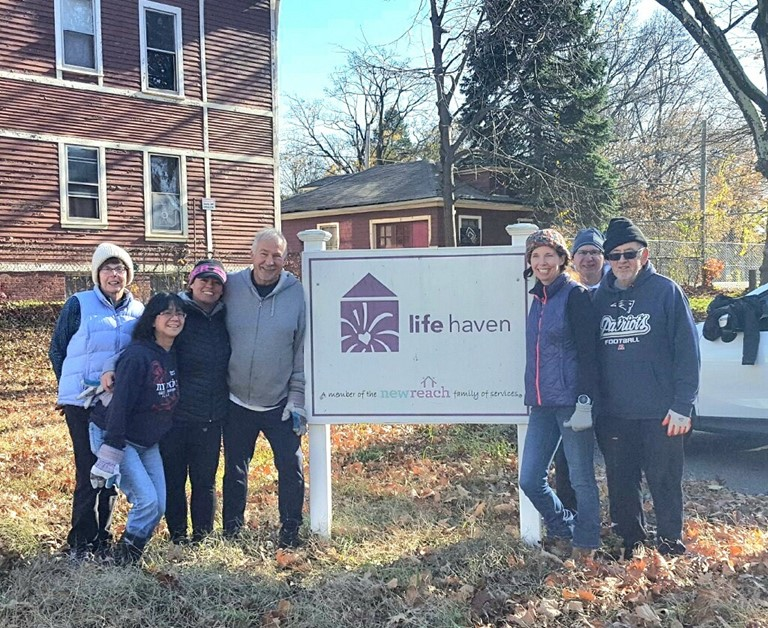New Haven-based homelessness nonprofit receives $2.5 million from the Jeff Bezos fund
New Reach, a New Haven nonprofit that provides housing support, was one of the 40 organizations receiving funding from the Day 1 Families Fund.

Courtesy of New Reach
New Haven-based nonprofit New Reach received $2.5 million from Jeff Bezos’s Day 1 Families Fund to continue combatting homelessness in Connecticut.
New Reach has been working to reduce homelessness in the state since 1990. The organization works in three main areas: eviction prevention, providing emergency shelters for the homeless and developing more affordable housing units. This November, they were among 40 organizations to receive funding from the Day 1 Families Fund, which is Jeff Bezos’s philanthropic charity started in 2018. New Reach plans to use the awarded $2.5 million to grow their housing efforts.
“We’re going to take our model … and expand … throughout all of our three areas of programming,” Kellyann Day, chief executive officer of New Reach, told the News. “The goal is to keep folks moving through that system as quickly as possible, so that there’s … not a lot of [people on the] waitlist.”
Day said that currently there are 32 families in the Greater New Haven area that are on the organization’s waitlist for shelters. She said that Day 1 Families Fund contacted New Reach and encouraged them to apply for the funding. New Reach proposed a plan of scaling its work with the increased funding, with the hope of serving 500 more families in need in the next few years.
According to the fund’s website, the charity provides assistance to the nonprofit organizations which are doing “compassionate, needle-moving work to provide shelter and hunger support to address the immediate needs of young families.”
“There are a bunch of ways that I think you could do ineffective things, too. So you have to think about it carefully and you have to have brilliant people on the team,” Bezos said about his philanthropic strategy in an interview with CNN.
Day said that New Reach combats homelessness through its three areas of services, and that the different programs are not interchangeable. Day explained that investing in just one area will not end homelessness.
“The way … federal government defines ending homelessness is by making it rare, brief and one time or non recurring and that’s what we do in those three areas,” Day said.
New Reach operates shelter diversion for families, with two other emergency shelters serving women with children and single women. The organization also owns about 100 units of permanent supportive housing and affordable housing, which it rents to people in need.
Day also said that New Reach implemented a number of groundbreaking programs over the years, providing the first supportive housing for families in the state and the first non-time-limited youth housing during COVID-19.
She added that housing and homelessness affects different groups unequally. She said that during the COVID-19 pandemic daycare facilities were closed and women were not able to go to work, which led to unstable housing situations.
“And I would also say that the majority of families [New Reach supports] are headed by BIPOC women who are underpaid and there’s a huge wage gap,” Day said. “They’re working twice as hard and not making enough money to support the increase in cost of housing.”
Aisha Bello had been a client of New Reach from 2016 till 2020. Bello told the News that the organization provided an affordable rental housing unit to her, giving her a stable environment when she was fired from a job.
“Not having any type of … direction of where I was gonna go was very scary,” Bello said. “[New Reach] helped me get on my feet, so I [could] get another job. It really helped me succeed … as I really needed that push.”
Now, Bello is part of the board of directors of New Reach. She said that prior experience of being a client of New Reach helped her improve the services, as she knew first-hand about the problems people live through.
New Reach employs many people with lived experiences of homelessness or housing issues in each of the areas the organization works on. Bello also stressed that New Reach pays attention to the diversity of the organization, so it can represent different social groups.
“We don’t just recruit based on how much money they have, or whether they’re a leader in their position,” Bello said. “But can they also represent someone who looks like them?”
As of 2019, New Haven counted 503 people experiencing homelessness, 98 of them children.
Interested in getting more news about New Haven? Join our newsletter!







